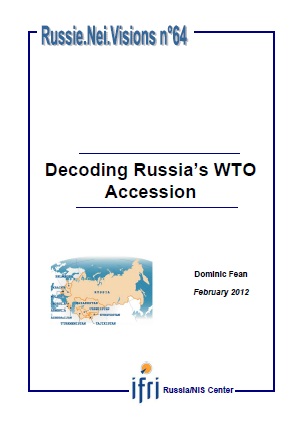Decoding Russia's WTO Accession

As Moscow and the WTO Member States have finally established terms on which Russia will accede to the organization, thoughts turn to the impact of this historic event and the potential for it to play a role in the modernization of the country’s economy. The process has been long, with Russia having to negotiate bilateral accession protocols with the more than fifty WTO member states.
The numerous delays have been driven more by political considerations than by economic ones. As such, accession can be expected to have important political effects, indicating Russia’s renewed interest in international cooperation. However, uncertainty over how the regime will develop after the March 2012 presidential elections could have a significant impact on how Russia implements its international obligations, and how profound domestic reform is.
An earlier version of this paper was presented at a conference organized by Ifri in the framework of the Eurasian Trade Task Force (ETTF), 17 October 2011. The ETTF addresses the different commercial and economic integration projects in Eurasia and their impact on domestic and foreign policies of the states concerned.
Download the full analysis
This page contains only a summary of our work. If you would like to have access to all the information from our research on the subject, you can download the full version in PDF format.
Decoding Russia's WTO Accession
Related centers and programs
Discover our other research centers and programsFind out more
Discover all our analysesRussia, the Palestinians and Gaza: Adjustments after October 7th
The Soviet Union (USSR), and subsequently the Russian Federation as its internationally recognized legal successor, has consistently sought to play a visible role in efforts to resolve the Israeli-Palestinian conflict.
Deathonomics: The Social, Political, and Economic Costs of War in Russia
The report attempts to outline and examine a truly new phenomenon in Russian society, dubbed “deathonomics”—the making of a mercenary army against the backdrop of the Kremlin’s war in Ukraine, eventually replacing both the Soviet (conscript) and early new Russian (contract) armies. It notes that, by the end of 2023, this trend had turned the military service into one of the highest-paying professions in the country, something not seen in Russia on such a scale since the late 17th century.
Russia's Asia Strategy: Bolstering the Eagle's Eastern Wing
Among Russia’s strategic priorities, Asia traditionally played a secondary role compared to the West. In the mid-1990s, then Foreign Minister Yevgeny Primakov initiated a rapprochement with China and India. Then, in 2014, deteriorating relations between Russia and the West prompted Moscow to begin its “great pivot to the East”.
Kazakhstan After the Double Shock of 2022: Political, Economic and Military Consequences
The year 2022 represented a dual shock for Kazakhstan. In January, the country faced its most severe political crisis since independence, followed in February by Russia’s full-scale invasion of Ukraine, which cast uncertainty over the borders of post-Soviet states. These consecutive crises profoundly shaped Kazakhstan’s domestic and foreign policy.











